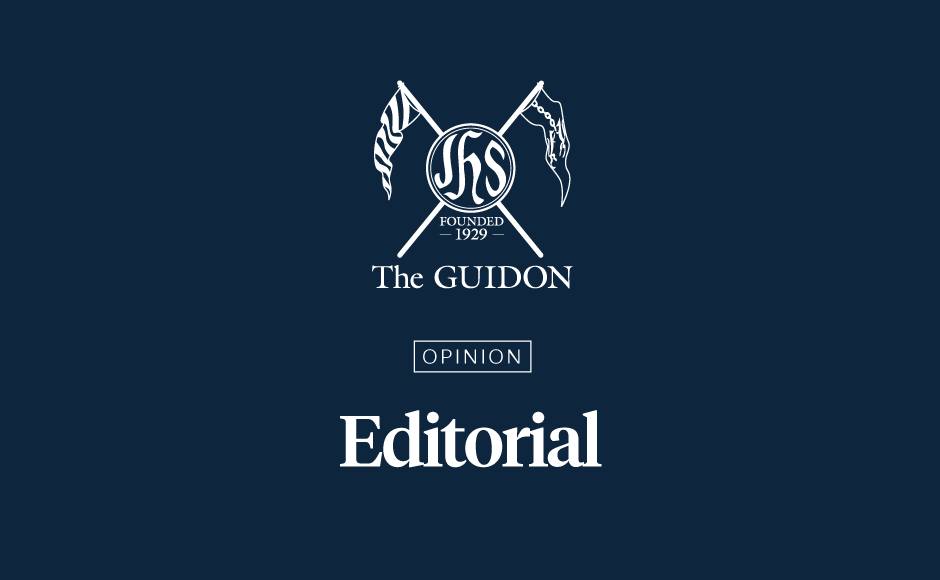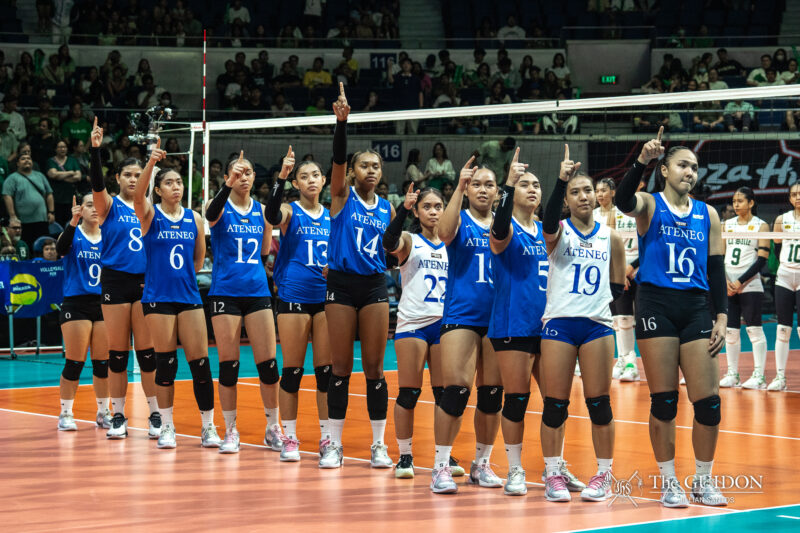In 2010, The GUIDON became the subject of Matanglawin’s lampoon issue, Tanganglawin. Perhaps, the criticism stems from a perception then (and maybe even now) that we are soft and shallow when it comes to covering issues in and out of the campus.
Whatever the reason may be, this is Matanglawin’s right as a journalistic publication. We believe that this right must be protected and upheld pursuant to our Constitution and the laws of our land. The lampoon also reminds us that we are not perfect, and like everyone else, we are valid subjects of criticism.
All of us have our own imperfections—or to put it in Matanglawin’s terms, katangahan. Satire reminds us of this and serves as a reflection of reality. Comedy is the medium that attracts people to come and take a look at the mirror. At first, we laugh at what the mirror shows us, but then we realize that it is actually our own reflection that we are laughing at.
Aside from national politics, a long-running subject of Tanganglawin’s satire is the Artenista, code for Atenean elitism. As what Matanglawin wrote, “satire is not that far from the truth.”
Satire as a form of discourse is certainly welcome in our democracy. It allows for our society to be more critical and self-reflexive. Freedom of speech and the free exchange of ideas, opinions, and criticism without fear of backlash and retribution is the bedrock of a democratic society.
It is in this spirit that we condemn Mocha Uson’s irresponsible posting of Matanglawin Editor-in-Chief Rambo Talabong’s profile on her Facebook page in relation to the Tanganglawin issue this year.
As colleagues in journalism, we find this action alarming and dangerous. Uson should have thought about the implications of her act. She has unnecessarily exposed Talabong to cyberbullying by posting his personal details, therefore opening the possibility of endangering him and his rights.
Uson knows very well that several journalists, public personalities, and ordinary citizens have already been intimidated and threatened by trolls and fanatics just because of contrarian statements or opinions.
Equally alarming is the prevailing level of discourse in social media—the very subject of Tanganglawin’s lampoon issue. Vicious name-calling and attacks from both sides of the debate have created a vitriolic environment that is unhealthy for constructive discourse that is vital to democracy. This has led some people to tune out and disengage. In the words of a popular local matinee idol, “shut up na lang.”
But we cannot just simply “shut up.” The stakes are too high for critical voices to be silenced.
Thus, we call on everyone to fight this intimidation online and offline.
We call on everyone to post and critique responsibly on social media and on other media platforms.
We call on citizens to call out people or entities that have weaponized technology to threaten people and to spread malicious or false information.
We call on everyone to go beyond their screens and engage their fellow Filipinos in actual encounters and conversation.
We call on everyone to eschew personality-driven, ad hominem attacks and to just stick with the issues.
Uson, herself a subject to unfair slut-shaming from some quarters, echoes this sentiment. And we could not agree with her more.
In an October 12 post, she wrote, “[n]gunit kung talagang ‘matalino’ at ‘disente’ kayo huwag ang PAGKATAO ng DUTERTE SUPPORTERS ang atakihin niyo kundi yung argumento o ang isyu. (If you are really ‘intelligent’ and ‘decent,’ don’t attack the personality of Duterte supporters. Attack their arguments or the issue itself).”
It is our hope that Uson, along with all Filipinos, will follow her own advice.
All of us have our faults—mga katangahan—that we can improve on, and the beauty of democracy is that we can call each other out, talk about these issues, and change things together. We cannot let fear or intimidation stop this.








Name calling is not satire. Aim for a much higher standard. Retract, apologize, and write an Atenean code of conduct issue.
You must realize that your freedom to imply katangahan with the name of Mocha Uson justified as a form of satire will understably create backlash and name calling against your publication. You should not take that as a form of intimidation. Democracy is also letting others express through speech in the form and the manner they want. If you are sensitive, i.e., cry foul or being bullied, and not receptive or equally critical of the reactions hurled against you, then you should stop publishing satire. I sense that you don’t want to be treated that same way you are treating your subjects or personalities in your publication.
First rule of leadership, everything is your fault. I’m not saying that anyone is at fault but whoever this Rambo Talabong is, he has to own this up. Why hide behind the publication? Mocha Uson is owning everything up, at least she shows face.
“with the name of Mocha Uson justified as a form of satire will understandably create backlash and name calling against your publication. You should not take that as a form of intimidation. Democracy is also letting others express through speech in the form and the manner they want. ” – Taga UP
I second that. Satire publication entails a caution FIRST on the side of the writer. Publishing such, means that you are prepared for what may come against it (may it be ad hominem) especially Mr. Talabong leniently addresses himself both as the Matanglawin’s EIC and and Rappler staff in his social media account. To the very least, he must have hidden these facts if he is not ready for voluminous bashing from the defending side.
Given these, why are we somehow projecting that Talabong is a victim? We should not blame Ms. Uson for exposing this as a reflex.
You are being too selfish. When you do criticisms of a person, it must seem justified in your circle. However, when the person expounds criticism against you, you cower in your mother’s skirt and play the role of the victim. Moreover, you do this in a “pseudo-matured sounding” manner to make the defendant sound like an uneducated crunching aggressor.
At least check if you can hold yourselves responsible for the consequences of your actions. Check if you have what it takes before you publish a satire.
So it’s ok for the Tanganglawin editor to expose what they call Mocha Uson’s stupidity and other humiliating events about her, but it’s not ok for Mocha Uson to expose this magazine’s editor? Parang may mali…
1. This is The Guidon you’re commenting on, not Matanglawin. They are two separate publications, and it was Matanglawin that published the lampoon issue. I am clarifying this in response to your use of pronouns in the second person in a piece published by The Guidon.
2. Yes, Mocha Uson had every right to react however she wanted upon seeing that cover, but not at someone’s personal expense. The lampoon issue made a caricature of Mocha Uson’s blog on the cover (not even the person herself), but in retaliation, she posted the personal information of Matanglawin’s EIC on her page and put that person in great peril of cyberbullying. I am not a part of Matanglawin but I am pretty sure they expected to receive backlash when they published that satirical issue, but being bullied on personal terms is a different matter altogether.
On Taga Ateneo
1. Yes we are aware of that; sorry for my confusing use of prounouns. However, I am also very well aware of the sudden transition of The Guidon’s idea of clarifying their own side, to discussing the matter of Talabong vs. Uson; the latter already involves The Guidon’s opinion in the discussion. Therefore, some of my points actually uses those pronouns to intentionally point to The Guidon.
2. You cannot really blame Ms. Uson for that. Well, I’m not a fan of her opinions, but let me put it this way. There have been lots of satire in history that have gone heavily in its track. Let me clarify that you are actually implying that Ms. Uson must have been the compensating side or the mature side by “not exposing” the private matters of the Editor in Chief despite the satire.
However, first, we must note that the defending side has the right to identify and only to identify the perpetrator of the satire. Eg. the satire Charlie Hebdo. The Muslim community has the right to identify and ONLY TO identify who made those satire. The killings that have been committed was done by their extremist supporters. Simply put, the attacks must be attributed, not to the defendant, but to the extremist supporters.
Why is that so? The defendant has the right to actually impress upon the satire writer that he/she has the knowledge of who is actually biting his/her tail; this is to say that he/she is aware of the propaganda behind and he/she knows who is liable for further attacks below the belt.
Similarly, why are we not pointing fingers, but rather, are supporting De Lima when she actually relies to trials by publicity? De Lima points to the perpetrators, and are in a parallel situation with Uson, only with a weaker case for the latter. This shows that we are actually in a case of double standards in our society. When we show that the one is for the “masa” we collegians tend to be skeptical, whereas when the one is for the “elite-intellectuals” we tend to support them without prior inspection of our standards.
No matter what or how we say it, they will never understand. Mocha will never understand. Her supporters will never understand. It is because they had no background whatsoever about responsible journalism per se. She wasn’t trained the way communicators do in the 4 years plus the wisdom and knowledge learned in the years of journalism practice. She has her own understanding of what journalism is all about. She thought what journalist does is just write and report. That is why she thought it is that easy to copycat and be like a journalist. There is no point explaining to her unless she enroll a course in communication or undergo a training to teach her the right lessons.
After reading John Dryden’s Mac Flecknoe, I must respectfully disagree that name-calling is not satire.
ang tawag sa yo ay banlag dahil magkaiba ang nakikita ng dalawang mata mo